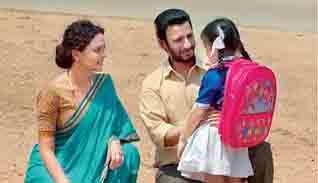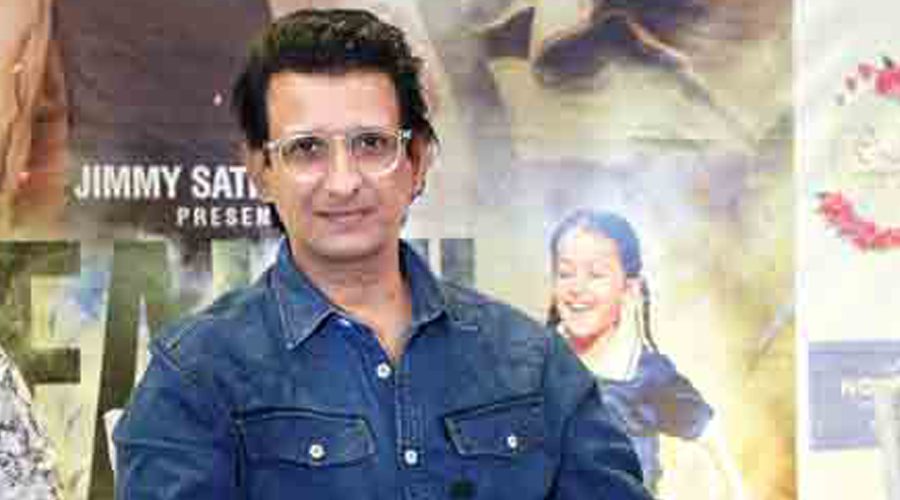Sharman Joshi’s Mera Fauji Calling is currently playing in theatres. Recently, Sharman was in Calcutta, accompanied by his co-star Bidita Bag, to promote the film. The Telegraph caught up with the star of films like Rang De Basanti and 3 Idiots for a chat.
Given that you have come here quite a few times, what is your sense of Calcutta as a city?
I haven’t really got a chance to live in Calcutta and get a sense of the city, so to speak. But I have often been to Park Street, and I find that area charming. There are many other parts of Calcutta, like a few markets, which I have been to... I have no idea why I went there in the first place! (Laughs)
It’s a city that I have also found culturally rich whenever I have been here with my plays. I have always got great love and respect, the people here enjoy their theatre very much. It’s always a pleasure to be here.
Calcutta has a very vibrant food culture. Any must-haves whenever you are here?
Oh yes! The last time I was here, the organiser took me to have phuchka and jhalmuri, which I liked.
What is it about Mera Fauji Calling that made you want to sign on?
The story. For me, it always has to be a story that excites me on paper and hopefully translates as effectively on screen. This is Aaryaan’s (Saxena) first directorial venture. But he has written screenplays for a few other films earlier. I have always felt that someone who can write a good story and screenplay can make a good director. I thought it was worth taking a chance because I found the story very interesting.
It’s a beautiful, heart-warming human story set in a hamlet in Jharkhand. It specially focuses on a soldier’s family. In most films, the focus is always on the soldiers and their lives in the line of duty. Rarely have we seen what a family goes through after a soldier dies on the battlefront. Through this film, we are trying to sensitise people to the fact that the families of soldiers should be equally admired and applauded. The sacrifices they make are as valuable as what a soldier does.
What we try and show is what life is like for a family with someone’s presence and then his absence. From joy to sadness and the little moments that a family shares, there are myriad emotions in this film.

Sharman with Bidita Bag in a moment from Mera Fauji Calling, now playing in theatres
Does the energy and enthusiasm of a first-time director also reenergise you?
It cuts both ways. There is an advantage, in the sense that a first-time director, as you said, is infused with plenty of energy. It mostly works as a positive, but sometimes excess of energy spoils things (laughs). As long as a director finds his balance, it works well. But yes, it’s mostly advantageous.
What do you make of the times we are living in, as far as the quality of Indian entertainment is concerned?
Now I have even more of a sense of pride in my father (actor Arvind Joshi) and my uncle (Pravin Joshi), who followed their passion irrespective of how the economic outcome would be and with a large chance of them being on an empty stomach. These guys were the real daredevils. I think I have inherited a lot of my talent from them and a lot of exposure to that world, and I have learnt some really valuable lessons from my father.
In contrast to that, these are golden times for those who want to take up acting as a career, in terms of the platforms available and the safety net that one has. As long as you are a good actor, you don’t need to worry about finding work.
Ageism plagues the female actors of the industry. Contrary to perception, does that apply to male actors as well?
I think age has ceased to matter to a large extent for the female actors, and also whether they are married or not. As long as you are a good actor and you fit the bill, you will be cast for the character, no matter what your marital status is or how old you are. Male actors are expected to play character roles after a certain age, but I think those things will also change.
In Hollywood, they consider actors to come into their own only when they are in their 40s because you understand yourself better, you gather life experiences and hence you are able to understand your craft better. I believe that now that I am in my 40s, I know myself better as both a person and an actor. There will be stories that need younger actors, but at the same time, there are stories that need 40-plus actors to play pivotal roles.
What’s next?
I am doing an out-and-out comedy with Umesh Shukla, and after that is a thriller called Penthouse directed by Abbas Mustan.










